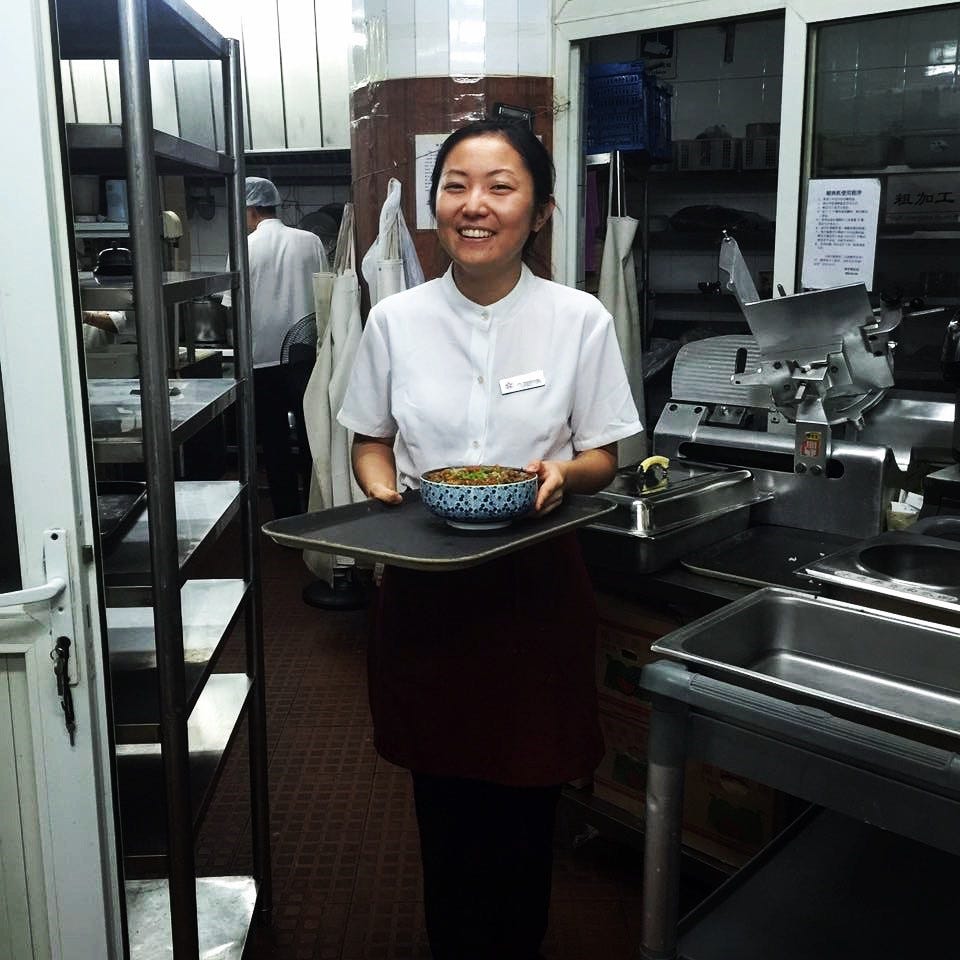Janice Jia ’17 describes her summer working in a Beijing teppanyaki restaurant conducting first-hand research on the lives of migrant workers. Janice received summer funding for her research from the Fairbank Center, and is the undergraduate honorable mention of our 2016 travel essay competition.

Outside the floor-to-ceiling windows of the restaurant, I see the busy intersection of an emerging global city. A curved, white outlined crest of Zaha Hadid’s SoHo peek out behind the towers of a Fortune 500 company. Mercedes-Benz’s larger-than-life logo towers above all. The flourishing commercialized environment surrounding the restaurant starkly juxtapose the lives of the migrant workers busy serving customers.
This past summer, I worked full-time at a teppanyaki restaurant in Beijing as part of an ethnographic research project for my senior thesis. After the 1978 economic reforms, low-income migrant workers have fueled the nation’s ascendance to the world stage by taking temporary, low-skill, and informal jobs in the manufacturing and service industries in cities, changing China’s social fabric.
With growing inequality and stagnating GDP growth, the current plight and future trajectory of this mobile working class, 274 million strong by the end of 2014, will have major impacts on China’s socioeconomic development. I went to Beijing to learn about their views on social mobility and their understandings of personal success.

A Typical Day
6:30 a.m. wake up to type field notes from the day before
9:00 a.m. start getting ready for work
9:20 a.m. walk to the bus stop
9:50 a.m. arrive at the restaurant and change into the uniform
10:00 a.m. morning roll call, morning exercises, and reciting of the restaurant slogans
10:10 a.m. breakfast
10:30 a.m. waiting staff meeting and beginning of sweeping, mopping, and other general preparations
11:30 a.m. customers start to order and beginning of carrying trays of dishes.
2:00 p.m. break where most employees napped, talked with family, watched TV on their phones, went to the supermarket
4:00 p.m. lunch followed by the same schedule as the morning routine
10:00 p.m. shift ends and dinner
10:30 p.m. walk to bus stop
11:20 p.m. get back to the apartment
With a new environment, a full schedule, and daily field notes, I was fully immersed into this little microcosm. My first day on the job, I was taken aback by the morning exercises. I stood in disbelief as the migrant workers that I would soon get to know stood in straight rows reciting:
“A new day, a new beginning, I will use love from my body and soul to welcome today, because that is the secret to success…I am a [restaurant name] employee, I am [restaurant name’s] most outstanding employee. Wholeheartedly serving the customers is my bounden duty. Customer satisfaction brings me the greatest happiness. We will work as a team to bring glory, we will use love from our body and soul to welcome the restaurant’s bright tomorrow. Let’s do it! Let’s do it! Let’s do it!”

The first two days were filled with a similar feeling of being completely out of place. I was nervous about doing my job at the restaurant right and not being a burden on others while also constantly worrying about the direction of my research. I was also physically exhausted from standing for so long each day. Without prior experience in the service industry, I thought that working at a restaurant would be tiring, but never could I have imagined just how difficult it would be. I had never been pushed as much mentally and physically. But slowly, I adjusted to this new pace of life.
There is no learning that can compare with walking in someone else’s shoes. Each day I would try my best to learn more about the people I was working with. I would jot down what was discussed during meetings, observe how different groups of people interacted with each other, and ask questions when the staff were not busy preparing food or waiting on customers.
I was generally welcomed by the staff who were interested in my background and got to learn a lot about their daily lives, and perceptions of their work and their futures. I met young girls who came to work at the restaurant because they did not get a high enough test score to continue on to middle school. Their options were to work or to go to trade school. I was there as they pondered their next steps and as they extravagantly bought sweets in a nearby KFC during breaks with their meager earnings.

I also met a young man who lived in 9 cities over two and a half years after he graduated from high school. While some of his peers went on to college, he had an array of jobs from selling health supplements to retired cadre members and industrial scales to factories, to his current job as a chef at this restaurant. Despite his long hours, he believed he made the right decision when he chose to earn his own money instead of going to school and depending on his family.
These are just a few of the people I got to know. In no way can I fully understand their lives with just a short four-week stay, but I walk away with a rich and intimate account of abstract ideas like urban development, marginalization, agency, and social mobility that I have discussed in the classroom. Despite the hard work — the hardest work I have ever had to do in my life — I walk away with smile for the people I got to meet, the stories I got to hear, and the challenges I surpassed.
Janice Jia is a senior in Harvard College, currently writing her undergraduate thesis on migrant workers in China. Janice received undergraduate summer funding from the Fairbank Center to conduct her research in Beijing last summer, and is the undergraduate winner of the Fairbank Center’s 2016 Travel Essay Contest.


